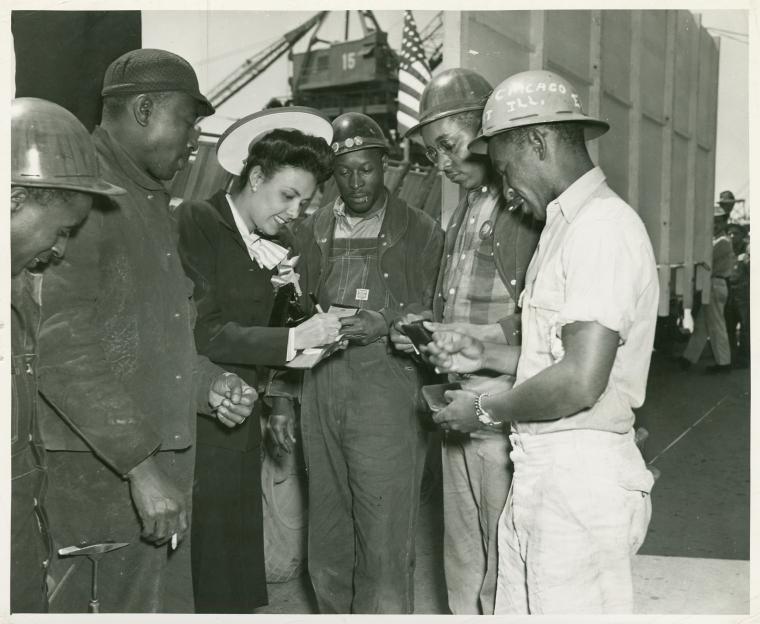The United Service Organizations (USO)

The Second World War saw dramatic increases from the first in the number of voluntary enlistments (6 million up from 2) and in draftees ( 11.5 million up from 2.8). As with the first World War, most of these newly enlisted were in their teens and twenties when headed to the frontlines of the war. At The behest of President Franklin D. Roosevelt, the United Service Organizations were established in 1941 to boost morale among service members while abroad and on leave. An amalgam of a number of religious and public institutions, the USO quickly went to work raising private funds to establish centers throughout the U.S. and abroad. These centers generally offered recreational activities like music and film screenings as well as its early hallmark, coffee and donuts.
As the USO became more well established, the organization became synonymous with its Camp Shows, live staged variety acts including some of the most well known stars of film, radio, and music. During the years of U.S. involvement in WWII the U.S.O. put on over a quarter of a million performances in the United States and abroad, and became significant mediators of popular culture to enlistees and their families. Likewise, the U.S.O. was the largest institution through which popular entertainers that were not enlisted became a part of the war effort. Such was the case with singer, actress, and dancer Lena Horne, pictured above autographing a photo. Having made her film debut in 1943 starring in Stormy Weather Horne toured extensively through the USO donating her time and helping to propel her career at a time when segregation in the film industry threatened her career prospects. Throughout her time with the USO Horne performed domestically and made frequent appearances on Armed Service Radio Programs introducing many to her voice and music.
Jane Frohman, pictured right singing on an Armed Forces Network broadcast in 1943, had a similarly prolific tour with the USO albeit after she had become a well-established figure in popular music. Frohman rose to prominence after being featured in the 1933 renewal of the famed Ziegfield Follies Broadway review and by 1934 was one of the most popular singers in the country. Frohman performed extensively in Europe through the USO, although her life was almost claimed by a deadly air crash in Portugal. Even with permanently debilitating injuries, Frohman continued to tour extensively giving 95 concerts in 1945 alone.
As service members were surrounded by USO events overseas and domestically, the USO quickly became a fixture of American popular culture. During the war the USO's influence was such that the U.S. Army became concerned that the USO would dissuade potential enlistees as depictions of the USO centers in films were so lush that it made military service look spartan by comparison. The popularity of the USO and its camp shows reached the point that Irving Berlin was hired to produce a feature-length musical and film about entertainment's role in the war which became This Is The Army. The hugely successful production would go on to tour internationally non-stop until after the end of the war. The USO quickly became singularly influential in shaping the relationship between popular entertainment and the military, a relationship that would continue to the present day.

Photo Credits
Schomburg Center for Research in Black Culture, Photographs and Prints Division, The New York Public Library. "Lena Horne, African American actress, singer, and sponsor of the SS George Washington Carver, signing autographs for African American shipyard workers who helped build the ship, on the day of its launching, Richmond Shipyard No. 1" New York Public Library Digital Collections.
Billy Rose Theatre Division, The New York Public Library. "Jane Frohman in uniform facing microphone." New York Public Library Digital Collections.
Sources Cited
Andrews, Maxine (Maxene), and Bill Gilbert. Over Here, Over There: The Andrews Sisters and the USO Stars in World War II. New York: Kensington, 1993.
Feldstein, Ruth. How It Feels to Be Free: Black Women Entertainers and the Civil Rights Movement. Oxford: Oxford University Press, 2013.
Stone, Ilene. Jane Froman: Missouri’s First Lady of Song. Columbia: University of Missouri Press, 2003.
